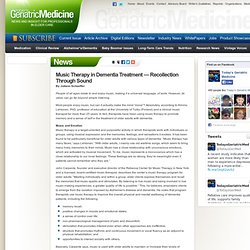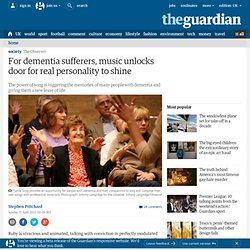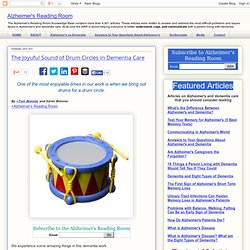

Old Man In Nursing Home Reacts To Hearing Music From His Era. Home. What is Singing for the Brain? - Singing for the Brain. Singing for the Brain is a service provided by Alzheimer's Society which uses singing to bring people together in a friendly and stimulating social environment.

Singing is not only an enjoyable activity, it can also provide a way for people with dementia, along with their carers, to express themselves and socialise with others in a fun and supportive group. Hidden in the fun are activities which build on the well-known preserved memory for song and music in the brain. Even when many memories are hard to retrieve, music is especially easy to recall. Singing for the Brain was recently featured in a BBC Radio 4 documentary looking into the emotional significance of Handel's Hallelujah Chrous, which is available to listen to now. Find out more in our Frequently Asked Questions Take a look at our Singing for the Brain video See full transcript for this video Other activities If you don't want to or cannot sing there are other activities you can do.
Singing for the Brain - an introduction - dementia services. Playlist for Life. Music Therapy in Dementia Treatment — Recollection Through Sound. By Juliann Schaeffer People of all ages relate to and enjoy music, making it a universal language, of sorts.

However, its value can go far beyond simple listening. Most people enjoy music, but can it actually make the mind “move”? Absolutely, according to Kimmo Lehtonen, PhD, professor of education at the University of Turku (Finland) and a clinical music therapist for more than 25 years. In fact, therapists have been using music therapy to promote memory and a sense of self in the treatment of older adults with dementia. Music and Emotion Music therapy is a target-oriented and purposeful activity in which therapists work with individuals or groups, using musical expression and the memories, feelings, and sensations it evokes. Basically, Carpente says, music is used with older adults to maintain or increase their levels of physical, mental, social, and emotional functioning. The world’s first music therapy degree program was established in 1944 at Michigan State University.
For dementia sufferers, music unlocks door for real personality to shine. Ruby is vivacious and animated, talking with conviction in perfectly modulated sentences, making statements and posing questions with bright, alert eyes and expressive gestures – yet none of it makes sense; random words float down the babbling stream that is her dementia.

But sing an old song with Ruby, and the lyrics fall into place, all recalled, all cherished. She becomes her lively, coherent, younger self once more. Ruby is one of 670,000 dementia sufferers in Britain today. A further 400,000 are thought to be suffering but are undiagnosed – a situation described as a "national crisis" by David Cameron, who has promised to more than double research funding to £66m by 2015. The use of music in dementia care. As populations of developed nations age, so the number of cases of dementia increases.

As a way of helping care for and support people with dementia, music has been shown to often have a dramatic effect. Whether it’s 60s soul, operatic arias or songs from the shows, music can soothe, stimulate and bring to mind long-forgotten memories. Nick Smurthwaite investigates... Dementia is rapidly becoming the health and social care challenge of the 21st century. Numbers affected are set to soar because of an expanding older population. The total number of people with dementia in the UK is predicted to be in excess of 1m by 2021. The power of music The power of music, especially singing, to unlock memories and kickstart the grey matter is an increasingly key feature of dementia care. 'We tend to remain contactable as musical beings on some level right up to the very end of life,' says Professor Paul Robertson, a concert violinist and academic who has made a study of music in dementia care.
Lost Chord. The Joyuful Sound of Drum Circles in Dementia Care. One of the most enjoyable times in our work is when we bring out drums for a drum circle.

By +Tom Brenner and Karen Brenner+Alzheimer's Reading Room We experience some amazing things in this dementia work. One of the very best experiences is when we incorporate music into our work. Enhancing Life Through Music.